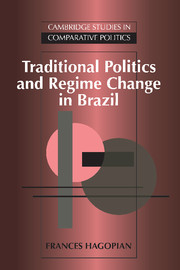Book contents
- Frontmatter
- Contents
- List of tables and figures
- Preface
- Glossary of abbreviations and Portuguese terms
- 1 Introduction: Traditional politics, new authoritarianism
- 2 Oligarchical power and traditional politics in Minas Gerais
- 3 The modern political economy of traditional politics
- 4 Bureaucratic authoritarianism and the state elite
- 5 Back to patronage: State clientelism in Minas Gerais
- 6 Authoritarian politics and traditional elites
- 7 The traditional political elite and the transition to democracy
- 8 Continuity in change: Brazilian authoritarianism and democratization in comparative perspective
- Appendix: The Minas elite
- References
- Index
4 - Bureaucratic authoritarianism and the state elite
Published online by Cambridge University Press: 06 January 2010
- Frontmatter
- Contents
- List of tables and figures
- Preface
- Glossary of abbreviations and Portuguese terms
- 1 Introduction: Traditional politics, new authoritarianism
- 2 Oligarchical power and traditional politics in Minas Gerais
- 3 The modern political economy of traditional politics
- 4 Bureaucratic authoritarianism and the state elite
- 5 Back to patronage: State clientelism in Minas Gerais
- 6 Authoritarian politics and traditional elites
- 7 The traditional political elite and the transition to democracy
- 8 Continuity in change: Brazilian authoritarianism and democratization in comparative perspective
- Appendix: The Minas elite
- References
- Index
Summary
In the early 1960s, the traditional political elite was anchored in and dominated the state. It commanded the executive, legislative, and judicial branches of federal, state, and local governments, as well as the state militias. In 1964 when it perceived a threat to its hegemony, it conspired with military and other civilian elites to overthrow the constitutional regime and safeguard oligarchical privilege. While politicians in the UDN, the party of the “outs,” hoped to gain more from the military coup than did their rivals in the PSD, the traditional political elite as a whole fully expected to share power with the military. Members of the elite anticipated that a caretaker military government would demobilize autonomous mass movements, purge Communists and other political undesirables from government and the arena of formal politics, and then promptly restore to them the reins of state.
The military did, as the traditional elite hoped, swiftly and decisively dismantle the populist coalition that had supported the deposed President Goulart. But instead of restoring power to Goulart's civilian rivals in the parties of the oligarchy, it excluded them from power. The military reserved governing power for itself, balked at adhering to a timetable for new presidential elections, and began an assault on the practice of politics within the state. The new rulers centralized economic policy making in the national ministries, strengthened the executive in firm military hands, and purged key federal state posts of traditional as well as populist politicians and replaced these with uniformed military officers and civilian economists, engineers, educators, and professional administrators – the core of a new technocratic elite. Slowly, the shape of a bureaucratic-authoritarian state took form.
- Type
- Chapter
- Information
- Traditional Politics and Regime Change in Brazil , pp. 104 - 139Publisher: Cambridge University PressPrint publication year: 1996

